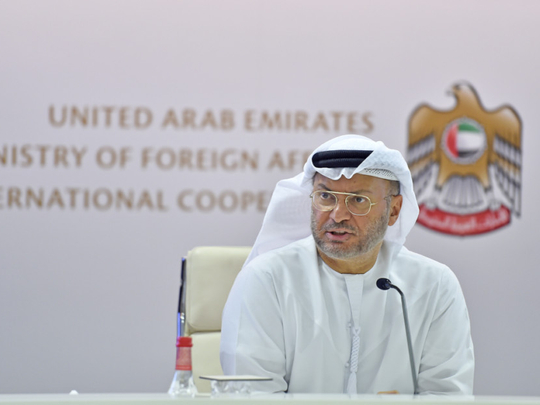
Dubai: Qatar’s pledge to support Turkey with $15 billion in direct investment on Wednesday was largely seen as a compulsory payback dictated by the growing dependence of Doha on Ankara.
UAE State Minister for Foreign Affairs Anwar Gargash was quick to comment on the lack of full sovereignty.
“Full sovereignty cannot be bought with money but is achieved by establishing sincere and reliable relations with surrounding countries,” Gargash shared with his 829,000 followers on Twitter.
The Turkish lira has recently lost significant value, nose-diving to 7.24 for the dollar in the exchange rates last week, amid a worsening dispute with the United States.
Ankara sought financial support from several countries and its Minister of Treasury and Finance Berat Albayrak flew to Kuwait in an attempt to secure $1.8 billion that would help deal with the free-fall of the lira.
Kuwait later denied reports it provided $1.6 billion to back the floundering Turkish currency.
On Tuesday, an editorial in the Turkish newspaper Takvim questioned the significance of the “friendship” with Qatar which remained silent and did not make moves to assist Ankara.
Qatar’s Emir later called the Turkish president later on Tuesday and the two leaders met on Wednesday.
Following the meeting, attended by Albayrak, Qatar announced the direct investment of $15 billion to Turkey.
Several analysts in the Gulf observed that Qatar had been forced to foot the bill in exchange for keeping a Turkish military base and Turkish soldiers on its soil.
“Qatari leaders felt obliged to pay Turkey back for the favours it had given them after an Arab Quartet severed trade and diplomatic relations with Doha,” analysts quoted by Saudi news site Sabq said on Thursday.
On June 5, 2017, Bahrain, Saudi Arabia, the United Arab Emirates and Egypt cut off their ties with Qatar accusing it of supporting terrorism and financing extremism.
The Quartet charged that Qatar had failed to honour the pledges it made at a meeting in Riyadh to follow the line of the Gulf Cooperation Council (GCC) in dealing with terrorism and extremist groups.
The GCC, founded in 1981, comprises Bahrain, Kuwait, Oman, Qatar, Saudi Arabia and the UAE.
The Quartet issued a list of demands and asked to comply with them; however, Qatar denied the charges, rejected the demands and moved closer to Turkey and to Iran, in a move that compounded the situation.
Despite several warnings and numerous recommendations to Doha that it should seek a GCC solution to the crisis, Qatar reinforced its dependence on Turkey.
“The problem is that Turkey succeeded in making Qatar’s leaders believe that its soldiers had saved them from a military invasion by GCC troops and that without them, their country would have collapsed,” the analysts said.
“Doha believed the rumours and allegations about a military invasion and started claiming that it was being targeted by its neighbours in a bid to win support from other countries. Now, we see how Qatar has in fact given up some of its sovereignty and how it is forced to make decisions that do not serve its interests and in fact may jeopardise its relations with the US.”
One analyst said that Qatar’s bow to Turkey comes after the bow to Iran when it stated that its trade relations with Tehran were continuing despite the US sanctions.











